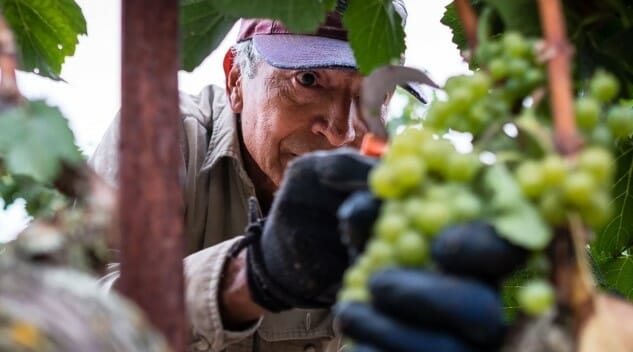It’s Hard to Capture What Napa Valley Is Really Like: Harvest Season Gives It a Fair Shot
Photos via PBS / Independent Lens Movies Reviews wine
From my front door, the trip to Napa Valley is under an hour. It’s a landscape with which I am on relatively intimate terms, and I more than understand the romantic fascination it inspires in people. Look, California is beautiful. Napa Valley is insanely picturesque, even in the context of an insanely picturesque place. And the idea of being a winemaker here is understandably attractive—man, that is a lifestyle. Oh, sure, there’s drama and hardship and uncertainty; you’re at the mercy of the weather, the have/have-not gap is a yawning abyss, the cost of living and working is stratospheric and wine is above average in terms of its susceptibility to fads and bubbles. And that, too, is a story waiting to happen. So naturally, there are always documentaries being made about the wine industry. I mean, between the inherent drama and sensuous pleasure and grim sweaty work of the business and the epic handsomeness of the terrain, splendid documentaries must essentially make themselves. Right?
Harvest Season, debuting Monday on Independent Lens, is one of those documentaries; this one about the considerable and under-discussed influence of Latino wine-folk, from migrant vineyard workers to winemakers. Bernardo Ruiz’s film follows a handful of them (primarily, winemakers Vanessa Robledo and Gustavo Brambila, and seasonal worker Rene Reyes) through a year; one that happens to have been marked by catastrophic fires. It has nice photography (by Victor Tadashi Suarez), sympathetic characters, and plenty of dramatic subject matter; how anti-immigrant rhetoric and policies are crippling an industry that depends heavily on laborers from Mexico, how ecological disasters threaten viticulture, how winemaking is a uniquely high-risk endeavor in a brutal economy, how people who grow a crop come into a mutually cultivating relationship with the land they work.
I suppose that might be why the film ends up being oddly underwhelming. It’s trying to do too much, or not enough, or both. “Spotlighting influential Latino people in the Napa wine scene” is definitely a thing. “Examining the effect of changing immigration policies on a $220B American industry” is definitely a thing. “Examining how winemakers bounce back, or do not, from environmental catastrophe” or “Pulling back the curtain on the life of a migrant vineyard worker” ditto. All those things at once provokes a certain loss of… varietal typicity? I’m not sure. I’m not saying it cannot be done, but I am saying for my money it seems like it usually doesn’t get done, even in a nice, reasonable, good-spirited film like this one. For some reason, as telegenic and politically rife and inherently dramatic as Napa Valley winemaking is, it’s apparently really difficult to capture it in a documentary. Films about wine, winemaking and the wine business are many. And they largely suffer from whatever it is this film seems to be dealing with-an oddly diluted sense of purpose. It’s not boring, or bad. It’s just somehow less than the sum of its parts, like a field blend that doesn’t work. Sometimes sounding multiple tones at once creates a kind of majestic chord. Too many or too discordant notes and you don’t have a chord any more, you have noise.
Walk into downtown St. Helena, or Calistoga, or Healdsburg, and if you’re like most of us you’d be pretty challenged to keep from suffering a fit of sensory overload and sometimes crazed covetousness. One million beautiful yummy things barrage your senses: Tasting rooms, rolling vineyards, high-end restaurants and art galleries, monstrously cute boutiques and antique shops and kitchen gardens, housewares cleverly upcycled from barrel staves. Stands of eucalyptus trees with painted bark, thousands of starlings in fractal flocks, vast stretches of blooming rape spreading for acres like a bright yellow carpet. It’s Eden, and it’s consumer paradise and most normal people are prone to becoming dazed and distracted. Perhaps filmmakers have their own version of this, and can’t totally apprehend the Napa wine region without succumbing to a temptation to believe they can process more stuff than they realistically can. I’m not sure. But this is far from the first time I’ve seen a technically well-made, theoretically cogent documentary about California winemaking and wondered how it fell so far short of capturing it. Harvest Season is not blind or incompetent or unintelligent—far from it. It just has… I don’t know, maybe a proportion problem? Like it can’t quite go long enough or deep enough within the constraints it established for itself, and instead hangs in the middle. It’s definitely worth watching. There’s just something about it that doesn’t quite come together. And in that, it’s in pretty good company.
Director: Bernardo Ruiz
Starring: Vanessa Robledo, Gustavo Brambila, Rene Reyes
Release Date: Wednesday, May 15, 2019 (PBS/Independent Lens)